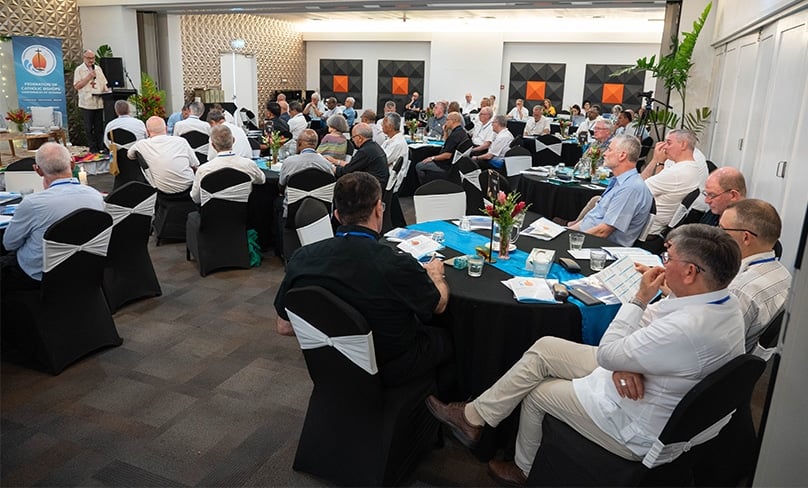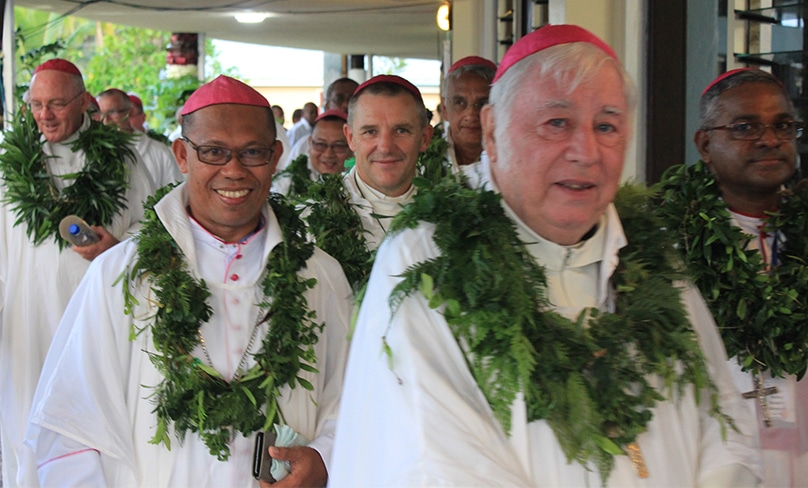
The Catholic Bishops of Oceania have identified “ecological conversion as an urgent mission priority” for the whole Church at the conclusion of a week-long gathering in Suva, Fiji.
The 2023 meeting of the Federation of Catholic Bishops Conferences of Oceania (FCBCO) met from 5-10 February as part of the continental stage of the synod on synodality.
The Bishops from Australia, New Zealand and the Pacific Islands toured Fiji, experiencing the inculturation of the Gospel in Fijian culture, the impacts of mining and climate change, and hearing talks from senior Vatican officials and local speakers.
In a concluding statement, the Bishops said they sought to become people grounded in Scripture, Tradition, and their “interpretation in our cultural traditions”.
“Lay people, whose mission is in the heart of the world, especially require formation in the Church’s tradition of teaching and acting on social issues and ecological crises – that is Catholic Social Teaching,” the statement said.
“We are not made the ‘body of Christ’ in order to shut ourselves in and be protected from the world.”
“Most of all, formation should mould us to be people who joyfully accept the invitation to participate in God’s mission.”
The opening Mass of the FCBCO assembly was celebrated by Cardinal Michael Czerny SJ, Prefect of the Vatican Dicastery for Promoting Integral Human Development.
In his homily, Cardinal Czerny told the Bishops that Christians, being salt and light, were not for themselves but to season and illuminate others.
“We are not made the ‘body of Christ’ in order to shut ourselves in and be protected from the world,” Cardinal Czerny said.
“Rather, we are incorporated into the Church in order to be blended into history like salt and light.
“Is the passion for Christ not worth taking some risks? Jesus accompanies our steps and keeps sending the Holy Spirit: does this not change our sense of the risks?”

The Bishops also heard from Synod Undersecretary Sr Nathalie Becquart XMCJ, who is currently on a world tour during the regional stage of the synod on synodality.
FCBCO President Archbishop Loy Chong of Suva also ended his term, with Bishop Anthony Randazzo of Broken Bay elected as his successor.
“Having been chosen as President of the FCBCO, it is my fervent prayer that the churches of Oceania will walk the way of Christ together in a spirit of synodality,” Bishop Randazzo said.
“Oceania is immense, and so working together is not merely a choice, it is an essential way for ministry, life and mission.”
The FCBCO meeting was also responsible for preparing the Oceania response to the document for the continental stage, “Widen the Space of Your Tent.”
“But we are looking for and waiting for a distinctively Pacific symphony of theological voices …”
The final document is yet to be released, but the Australian Catholic Bishops Conference said that the Bishops have been invited to imagine a “theology of the Pacific” that would give a distinctive voice to the region.
Archbishop Mark Coleridge of Brisbane, Australia, said what has been slowly emerging is a “distinctively Pacific voice or symphony of voices.
You don’t get one voice in the Pacific; you get many voices,” he said.
“But we are looking for and waiting for a distinctively Pacific symphony of theological voices, because the theology in this part of the world is based upon a different set of facts than in other parts of the world.
“It’s not just Western theology that has been exported.”
Related Articles:
